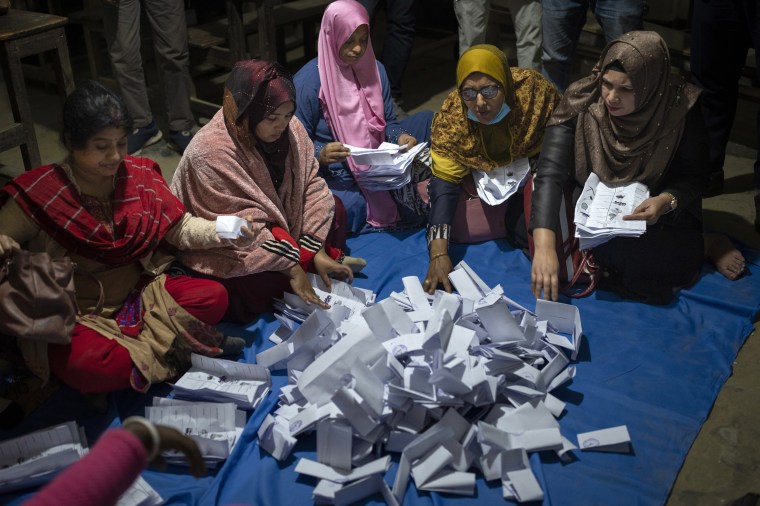DHAKA, Bangladesh — Prime Minister Sheikh Hasina has won an overwhelming majority in Bangladesh’s parliamentary election after a campaign fraught with violence and a boycott from the main opposition party, giving her and her Awami League a fourth consecutive term.
While the Election Commission has been slow to announce the results of Sunday’s election, TV stations with networks of journalists across the country reported that the Awami League won 216 seats out of 299. Independent candidates took 52, while the Jatiya Party, the third largest in the country, took 11 seats. The results for the rest of the constituencies were still coming in late on Sunday night.
The election was held in 299 out of 300 parliamentary seats. In one seat, the election was postponed as required by law after an independent candidate died.
A final official declaration from the Election Commission is expected on Monday.
At least 18 arson attacks preceded the vote, but the election day passed in relative calm. Turnout was around 40%, Chief Election Commissioner Kazi Habibul Awal said after the polls closed.
The main opposition Bangladesh Nationalist Party led by former premier Khaleda Zia refused to accept the election outcome, saying Bangladeshi voters have rejected the government’s one-sided election.
Security incidents, including four deaths in an arson attack on a passenger train on Friday, intensified tensions ahead of the election that was shunned by Zia’s party and its allied groups. They accuse Hasina of turning Bangladesh into a one-party state and muzzling dissent and civil society.
Authorities blamed the BNP for much of the violence, accusing it of seeking to sabotage the election. On Saturday, detectives arrested seven men belonging to the BNP and its youth wing on suspicion of involvement in the train attack. The party denied any role in the incident.
A victory for Hasina, 76, the country’s longest-serving leader and one of its most consequential, would come with a deeply contentious political landscape.
The vote, like previous elections, has been defined by the bitter rivalry between Hasina’s Awami League and the BNP, led by Zia, who is ailing and under house arrest on corruption charges, which her supporters claim are politically motivated.
The two women ran the country alternately for many years, cementing a feud that has since polarized Bangladesh’s politics and fueled violence around elections. This year’s vote raised questions over its credibility when there are no major challengers to take on the incumbent.
Badshah Mia, a rickshaw puller in Dhaka, said he wouldn’t vote given the limited choices, adding that the atmosphere didn’t exude that of “a fair election.”
Sakibul Hasan Chowdhury, a businessman, felt the same. “There is no opposition and no candidate of my choice. So how would I benefit from voting?”
A small business owner, Habibur Rahman, said he was voting for the ruling party candidate in his constituency but added that there didn’t seem to be much of a turnout.
The government has defended the election, saying 27 parties and 404 independent candidates are participating. But with scores of candidates from the Awami League running as independents and mostly smaller opposition parties in the race, analysts say Hasina’s win is near inevitable.
Michael Kugelman, director of the South Asia Institute at the Wilson Center, said none of those contesting would be able to mount much of a challenge to Hasina’s party. “The outcome is all but guaranteed, and that is that the Awami League will return (to power) again,” he said, noting that “Bangladesh’s democracy will be in an extremely precarious state once the election is done.”
The vote has also been called into question by accusations of a sweeping crackdown against the BNP. The party says about 20,000 of its members were jailed ahead of the vote on trumped-up charges.
The government disputed the figures and denied that arrests were made due to political leanings, saying the numbers of those arrested were between 2,000 and 3,000. The country’s law minister said in an interview with the BBC that 10,000 were likely arrested.
